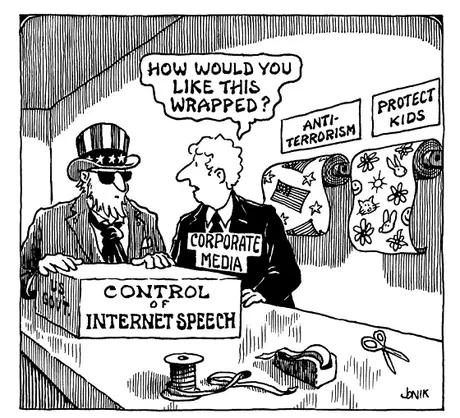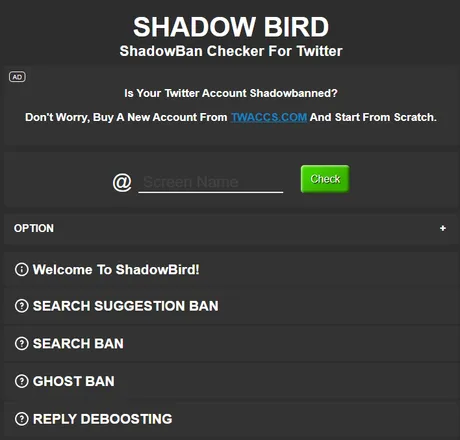
This topic of discussion has been hashed and rehashed on Hive over and over and over again, but hopefully despite all that I can bring in a fresh viewpoint. At the core of this often emotional and publicly dramatic issue is the idea of:
You downvoted me and that's censorship!
And there are some good points to be made about why this is true. If a post gets downvoted to zero then most frontends choose to hide it from view or put it farther down the list. Getting downvoted into negative rep is the same story: entire platforms will censor your comments behind a click-wall and other users have to dig in order to see what was actually said. For every user that would have read the comment but didn't (because of the click-wall) amounts to deboosted censorship at a basic algorithmic and statistical level, kind of like getting shadow-banned or echo-chambered on a WEB2 platform (which is common for the #hive tag on Twitter).
On the other side of the coin the arguments for why downvotes are NOT censorship are even better in my opinion. If you sign the message with your private key and you pay the posting cost (RCs) then the message will live on the blockchain forever and there's nothing anyone can do about it. How could such an outcome be censorship? The information is right there on chain for anyone to see. Forever.
What is the definition of censorship?
We must conclude that the main point of contention revolving around this issue is simply a clash around what the word "censorship" actually means (that and all the visceral emotional reactions that revolve around flag wars). There are many forms of censorship, and more often than not when two groups are arguing about these things they give "censorship" the definition that suits the argument that they happen to be making at the time.
Within the context of crypto and specifically Bitcoin or any other non-social-media asset censorship resistant means being able to broadcast a message and not have that message be blocked. When we send Bitcoin to someone else using POW mining, we don't care how many people view that operation on-chain. The message was sent; the value was transferred. End of story. Censorship was thwarted.
Those who issue downvotes and engage in this argument tend to employ this definition of censorship because obviously why wouldn't you? Can't be censorship because the message can be pulled up with any block explorer. Argument won.
Of course this ignores the actual goal of writing a post on Hive. The goal is to get views and spread the message. When an event happens that lessens the number of people that will see the message... that is also censorship. Of course both these definitions of censorship are completely different but just so happened to be employed within the same argument by two different sides... so the usage of the word itself becomes largely meaningless.

There are dozens of random third-party sites out there that will tell you if you've been ghosted on web2 platforms like Twitter. Everyone on Hive seems to be in consensus that being shadow-banned is censorship. Some even go so far as to claim that these are first-amendment violations (which ends up being a bit of a stretch because they are private companies but there is still a lot of merit to the argument).
When Blackrock flexes their muscle and broadcasts a message through the mainstream media and silences dissent we all agree it is censorship/propaganda. When advertisers and sponsors pull their funding because the company they are marketing through did or said something they don't like we all agree that's censorship.
What I'm saying here is that there are many examples of censorship being directly correlated with the manipulation of economic incentives. And yet there are a lot of people on Hive who understand all of this quite well but continue issue downvotes under the guise of, "No I'm not censoring anything I'm just 'equalizing the reward pool'," and whatnot. That's not really an argument made in good faith... or maybe it is because of all our previous conditioning.
Wrongful conditioning
Users like us who are heavy into crypto pretty much across the board have basically been conditioned into thinking that all censorship is bad no matter what and all centralization is bad no matter what. However, centralization is only bad if it has led to corruption within the system, and censorship is only bad when the thing being censored shouldn't be.
Nobody thinks it's a good idea for pedophiles to be able to store child-porn on the blockchain and have the data immutable for anyone to access at any time. Should we censor child-porn? Obviously yes. Who would ever even attempt to counter-point that unless they themselves were a pedophile that wanted access to child-porn? Ew. Go away. Please and thank you.
The concept that censorship is bad no matter what is obviously a false pretense born from an overreaction to the legacy system we are trying to overthrow. Censorship is only bad when the entity engaged in it does it in bad faith for personal gain. Of course many downvoters on Hive get accused of this exact thing... which we have to admit is a pretty bullshit argument considering that rewards just get returned to the reward pool and that casting downvotes has a very high chance of pissing people off and creating a flag-war situation in which everyone loses money.
It's very difficult if not impossible to censor content on Hive for personal gain on a financial level. The argument can be made that users with large stake are power-tripping and running around with a short-man-complex but that's another matter entirely.
Who's censoring who?
There's yet another vantage point to all of this as well. If I downvote someone to zero and they accuse me of censorship, I can deflect that blame onto the frontends because at the end of the day it's not my personal decision what gets curated and what doesn't. Imagine if I created a frontend for Hive that only showed content that got downvoted. After making such a product I could claim that not only was the content not censored, but it was boosted and I'm doing them a favor. That's next-level gas-lighting right there baby.
And yet I'd still be in the right.
The entity that controls how information is displayed on peakd.com is 100% dependent on the entity that controls peakd.com. The same is true for any Hive frontend such as hive.blog, ecency, leofinance, liketu, etc. If someone gets downvoted and deboosted from the frontends... that's really not the downvoters fault but the people running the frontends. The frontends have the ultimate say about what gets shown and in what order it will be displayed in. I've never seen someone complaining about downvotes/censorship come to terms with this reality. Such is the decentralized network of Hive. I don't make the rules.
Are people who get downvoted totally full of shit?
My experience with all of this is that they absolutely are a large percentage of the time. They'll spin these grand tales of persecution and censorship. They just "want to get their message out there" to help the world. Blah blah blah bullshit. They are complaining because they "lost money". It's obvious. If there was a button that flushed all blog rewards to zero for more pageviews: they wouldn't push the button.
You know how I know? Because, among many other telling situations, Hive is a very small network with very small reach. You can't really get censored on Hive because the number of people that can actually read the message in the first place rounds to zero in the face of bigger web2 entities like youtube, facebook, and twitter. If the goal was the spread the message at all costs then Hive is a stupid place to be at the moment. Obviously I hope this won't be the case for long but it is what it is. I won't pretend to be blind to make a point.
Conclusion
Censorship has many definitions, especially when conflating the transference of wealth with social-media influence. Be mindful about what definition is being used when the topic of resistance pops up. Without fail debaters will use the definition that suits their argument without even thinking about it.
Manipulating financial reward and censorship go hand in hand. This has already been proven beyond any doubt via web2 systems, gigantic hedge funds, and sponsorship/funding issues. The scientific method itself has been grossly manipulated by capitalism in this exact way.
Frontends have the ultimate say in all things curation. If leofinance decides to start running a 24/7 feed of cute cat videos nobody can stop @khaleelkazi from doing it. There's an extreme disconnect in the understanding of how this all works. Frontends are not required to create a trending tab payed on post payouts. They can do whatever the hell they please.
All censorship is not bad. Censorship is great, and that's going to become more and more apparent as crypto grows in strength and all kinds of crazy uncensorable content is floating around. Mark my words: be careful what you wish for. The Wild West of crypto isn't winding down. It's winding up. The regulators that think they are going to reign in the entire ecosystem are self-important dinosaurs at the end of their rope.
Return from Is Not Getting Paid Censorship? to edicted's Web3 Blog
